
| Publisher: | Douglas & McIntyre | |
| Genre: | Animal Stories, Teachings, Indigenous, Juvenile Fiction, Indigenous Peoples of Turtle Island | |
| ISBN: | 9781771624183 | |
| Pub Date: | April 2025 | |
| Price: | $18.95 |
| Children's & Young Adult |
by Richard Wagamese, illust. by Bridget George
A 2013 story from the Ojibway author Richard Wagamese's posthumous One Drum is excerpted and abridged to create The Animal People Choose a Leader, an affecting, melodic picture book about how, in a time when all the animals could understand one another, they came together to choose a commander.
Each animal has a different idea about what physical qualities might make a good leader, so they confer and decide a race will determine the outcome. Horse, Buffalo, Wolverine, Cougar, and Rabbit all enter the race. Anishinaabe author/illustrator Bridget George (It's a Mitig!) provides stunning, evocative full-bleed illustrations that highlight the wonder of the natural world while encouraging a closer look at the familiar. The layered colors that compose the animals and plant life is rendered in a soothing, warmly earth-toned palette. When Rabbit appears the ultimate victor, she refuses the role: "I understand that when all our energies are directed toward the same goal, there is no need for one to lead. We all help each other complete the journey." --Michelle Anya Anjirbag, freelance reviewer

| Publisher: | Tundra Books | |
| Genre: | Drawing, Art, Techniques, Crafts & Hobbies, Juvenile Nonfiction | |
| ISBN: | 9781774885031 | |
| Pub Date: | May 2025 | |
| Price: | $19.99 |
| Children's & Young Adult |
by Elizabeth Haidle
This enticing, inspiring book begins with a discussion about drawing. Drawing is not "a contest," "a waste of time," or only for the "talented ones"; drawing is a way to "explore, think and feel, experiment and question." Outlined in the table of contents as individual chapter headings are Elizabeth Haidle's tenets of drawing: "traveling, wondering, focusing, feeling, growing, not-knowing, and magic."
Readers are invited to take the pressure off and begin with just two things: a dot, which is "like a point on a map," and a line, which "takes you... somewhere." Haidle (Before They Were Artists) invites young creators on "scribbled adventures," smoothly integrating technical considerations such as scale, contrast, texture, and pattern. The author/illustrator wonderfully presents her introduction to drawing with strong-yet-delicate mixed media illustrations and mostly hand-lettered text. Drawing Is... promotes an inclusive, purposefully unintimidating approach by focusing on the process rather than the product, and offers all the encouragement that anyone who blinks, breathes, and reads--or listens to someone reading--might need to open a sketchbook and give drawing a try! --Lynn Becker, reviewer, blogger, and children's book author
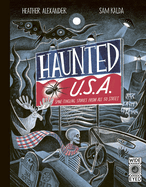
| Publisher: | Wide Eyed Editions | |
| Genre: | United States, Paranormal & Supernatural, United States - General, History, Juvenile Nonfiction, Places | |
| ISBN: | 9780711297364 | |
| Pub Date: | August 2025 | |
| Price: | $24.99 |
| Children's & Young Adult |
by Heather Alexander, illust. by Sam Kalda
Heather Alexander (Only in America!) invites readers to travel with her throughout the nation to learn about the country's uncanny legends, unnerving locations, hair-raising creatures, and spooky specters in Haunted U.S.A. All 50 states, as well as Washington, D.C., are represented by "spook-tacular tales" of haunted places, strange cryptids, and lurking spirits. There's the "pukwudgies" of Massachusetts, vengeful "ancient, magical woodland creatures" who "are woven into the folklore of the Wampanoag Nation"; a "paranormal hotspot" ballroom in a Louisiana hotel; and Alaska's soul-trapping "Kushtaka," a shape-shifting creature that often takes the form of an otter. A spectrum of goosebump-raising, strange, and mysterious stories speckled with facts and myths share the page with the unsettling graphite pencil illustrations of Sam Kalda (Of Cats and Men), who gives each state its own minimalistic but effective color palette of gray and one or two pops of color. Included with these weird tales are "A Ghost Hunter's Guide" that lists important gear for tracking down the supernatural, and a glossary with definitions of words like "orb" and "epitaph." This collection of coast-to-coast scares will delight, entertain, and (gently) spook young readers. --Lana Barnes, freelance reviewer and proofreader

| Publisher: | Eerdmans Books for Young Readers | |
| Genre: | Values & Virtues, Cats, Animals, Asia, Lifestyles, Social Themes, City & Town Life, Juvenile Fiction, Places | |
| ISBN: | 9780802856494 | |
| Pub Date: | September 2025 | |
| Price: | $18.99 |
| Children's & Young Adult |
by Jungyoon Huh, trans. by Aerin Park, illust. by Myungae Lee
The setup happens before the title page of Jungyoon Huh's extraordinary picture book, Late Today. Artist Myungae Lee captures threatening clouds looming over a crowded commute: "MORNING RUSH HOUR TRAFFIC IS CONGESTED ALL OVER SEOUL," Aerin Park urgently translates. At 8:15 a.m., "we can't be late today" is a common theme. Amid bumper-to-bumper cars, taxis, trucks, and buses, a two-week-old black kitten desperately attempts to stay alive. Many notice her, yet no one has "the courage to save her." One person finally stops, "gripped by fear... because they [can't] see the kitten anymore." Ignoring the honking protestations and pouring rain, the driver follows the "mew mew," to rescue the "quivering" bundle. Now, everybody is late. "But it's okay. Today was a good day to be late." Huh's exquisite story of simple kindness plainly exposes the hypocrisy of false concern. Meanwhile, Lee's heartening illustration of the tiny, helpless bundle finally safe in two comparatively behemoth hands provides a hopeful, restorative image of caring humanity. --Terry Hong

| Publisher: | Storytide | |
| Genre: | Dating & Sex, Emotions & Feelings, Paranormal, Occult & Supernatural, Ghost Stories, Mysteries & Detective Stories, General, Romance, Social Themes, Young Adult Fiction, Self-Esteem & Self-Reliance, LGBTQ+ | |
| ISBN: | 9780063346246 | |
| Pub Date: | May 2025 | |
| Price: | $22.99 |
| Children's & Young Adult |
by Julie Murphy, Jonathan Van Ness
Dumplin' and Pumpkin author Julie Murphy partners with Queer Eye star and Over the Top author Jonathan Van Ness in a funny, snappy, exuberant novel about a gender-nonconforming 18-year-old learning to celebrate and fight for queer people--with the help of a cheeky ghost living in a vintage handbag.
When sassy gay fashionista Sully's dream internship with a New York influencer falls through, they face the possibility of a summer--or longer--in their unsophisticated, prejudiced hometown. What they don't anticipate is finding the ghost of a "cuh-yuuuute" gay female impersonator from the 1950s in the potentially priceless leather bag they thrifted. Sully is additionally surprised by an unexpected romance, a deep dive into their town's queer history, and a shift in attitude from desperate escapism to considering the role they might have in "stand[ing] up for every other kid like me" if they stick around.
The high-octane combination of Murphy and Van Ness makes Let Them Stare a sparkling, thought-provoking, hyper-contemporary read, with regular references to cultural concepts and icons. Gorge! --Emilie Coulter, freelance writer and editor
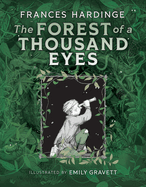
| Publisher: | Amulet Books | |
| Genre: | Fantasy, Adolescence & Coming of Age, General, Social Themes, New Experience, Juvenile Fiction, Action & Adventure | |
| ISBN: | 9781419777783 | |
| Pub Date: | August 2025 | |
| Price: | $19.99 |
| Children's & Young Adult |
by Frances Hardinge, illust. by Emily Gravett
Frances Hardinge and Emily Gravett's companion novel to Island of Whispers, The Forest of a Thousand Eyes, is an equally imaginative, visceral, and striking middle-grade illustrated novel.
The Forest is alive and hungry. Feather and her people live "within the stronghold of the Wall," a massive stone structure built to keep the villainous forest out. Over time, "the green... found weak points in the Wall and tore its way through them." Now, people only venture out of their "half-ruined" home under strict conditions. When the impossible happens--a new person appears and steals a precious tool--Feather does the unthinkable and chases him out beyond the Wall and into the Forest.
Gravett returns to her signature style of soft lines and shaded illustrations, all composed here in grayscale and green. The Forest of a Thousand Eyes, tinged with eco-horror, hinting at a dystopia, and suggesting a brighter future, examines what it means to survive and build community even in the darkest of times. --Kyla Paterno, freelance reviewer
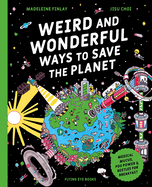
| Publisher: | Flying Eye Books | |
| Genre: | Environmental Science & Ecosystems, Animals, Recycling & Green Living, Insects, Spiders, etc., Science & Nature, Juvenile Nonfiction | |
| ISBN: | 9781838749606 | |
| Pub Date: | July 2025 | |
| Price: | $19.99 |
| Children's & Young Adult |
by Madeleine Finlay, illust. by Jisu Choi
In an illuminating book for middle-grade readers, science writer and audio producer Madeleine Finlay and illustrator Jisu Choi team up again (Beetles for Breakfast) to describe some seemingly outlandish approaches that scientists are exploring to slow or halt climate change. Finlay organizes the innovations by locations, like at the breakfast table, park, or farm. Each section begins with a description of the importance of the location followed by more detailed information about the different possible ideas. Examples include kelp packaging on the breakfast table, slug mucus band-aids in the bathroom, or garden beds made from old mattresses.
Weird and Wonderful Ways to Save the Planet is full of ingeniously zany notions that may one day save the planet, and it concludes with actions that young readers can take right now to help make "the world a cleaner, greener place." Choi's art is bright, playful, and extremely detailed giving readers illustrations of the eccentric, environmental concepts they can repeatedly examine. Finlay and Choi's collaboration is perfect for budding environmentalists or anyone concerned about the future of the planet. --Jen Forbus, freelancer
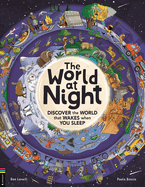
| Publisher: | Buster Books US | |
| Genre: | Environmental Science & Ecosystems, Animals, Zoology, Nocturnal, Science & Nature, Juvenile Nonfiction, Comics & Graphic Novels | |
| ISBN: | 9781837251087 | |
| Pub Date: | September 2025 | |
| Price: | $22.99 |
| Children's & Young Adult |
by Ben Lerwill, illust. by Paula Bossio
The World at Night is an enthralling guide that provides an expansive overview of what happens while (most) humans sleep, described through digestible passages and captivating illustrations. Travel writer and children's author Ben Lerwill (The Biggest Dog in the Book) establishes what night is, then transports readers to the world's oceans, forests, plains, deserts, poles, and cities to meet nocturnal and crepuscular ("active at dawn and dusk") critters, like climbing glowworms in Europe, Greenland's double-coated musk oxen, cacomistles ("rare, shy, raccoon-like creatures") tiptoeing through Mexico City, and pizza-loving Chicago rats. Intriguing floras are also featured, such as the Desert Ironwood tree that protects saplings beneath it, and concepts like light pollution and moon phases are smoothly tied in. Every page brims with whimsical art by Colombian artist Paula Bossio (The Wild Life of Animals), whose warm background tones, striking use of light and shadow, and subtly anthropomorphized fauna will likely inspire giggles. Fun spreads require turning the book sideways, while cross-sections of select places (like the Antarctic research section) reveal humans working past dark. The World at Night is a stellar nighttime companion. --Samantha Zaboski, freelance editor and reviewer
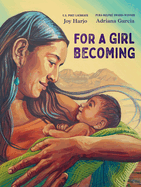
| Publisher: | Norton Young Readers | |
| Genre: | General, Poetry, Girls & Women, Juvenile Nonfiction | |
| ISBN: | 9781324052241 | |
| Pub Date: | April 2025 | |
| Price: | $18.99 |
| Children's & Young Adult |
by Joy Harjo, illust. by Adriana Garcia
Mvskoke Nation member and former U.S. Poet Laureate Joy Harjo (Poet Warrior; Girl Warrior) and Pura Belpré Award winner Adriana Garcia (All Around Us; Where Wonder Grows) combine their vast talents in For a Girl Becoming, an intricately constructed picture book comprised of a powerful free verse poem that speaks directly to a newborn baby, offering her advice as she grows.
A newborn baby's two Indigenous families bring ceremonial and practical gifts to the girl: "We carried tobacco and cedar, new clothes and joy for you.... They carried a cradleboard, hope, white shell, and turquoise for you." These objects appear in Garcia's sumptuous, magical paintings which depict both daily life and the world of spirit. Rainbows, smoke swirls from smudging, and powerful, racing horses--both of this world and not--appear throughout the illustrations. Readers will surely want to pore over this picture book and uncover all the beautiful details of this Indigenous family's life. A thought-provoking book for the mothers, grandmothers, and aunties in your life. --Melinda Greenblatt, freelance reviewer

| Publisher: | Magic Cat | |
| Genre: | Experiments & Projects, Games & Activities, Magic, Science & Nature, Juvenile Nonfiction | |
| ISBN: | 9781419786754 | |
| Pub Date: | September 2025 | |
| Price: | $24.99 |
| Children's & Young Adult |
by A.J. Wood, illust. by Jo Rioux
A creator of the wildly popular Ologies series, A.J. Wood matches talents with author/illustrator Jo Rioux (Cat's Cradle series) in The Wizard's Guide to Magical Experiences, a playful, interactive title for "wizardlings" (wizards-in-training) in which science and magic are one and the same.
"Wizarding can look like magic," Wizard Wood of Touchwood Academy of Magical Thinking explains, but it's actually all "chemistry." Forty kid-friendly experiments are divided into 12 sections (like "Experiments with Water" or "Magical Matter") that all use household supplies to guide wizardlings through interactive observations of chemistry. Practitioners can "Move Water to Your Command" (learning about principles like immiscible mixtures) and "Make a Color-Changing Potion" (based on the pH scale) using practical steps, safety tips, and spells ("Aqua calfacio!"). The book is gorgeously packaged, including gold foil, a 30 mm embedded jewel, and paper novelty elements; Rioux's charming illustrations feature pages packed with features to investigate as well as several children modeling the experiments in cozy fantasy settings. Inquiring minds of all ages will likely want to reproduce the magic. --Cristina Iannarino, children's book buyer, Books on the Square, Providence, R.I.

| Publisher: | Andrews McMeel | |
| Genre: | Animals, Zoology, Dogs, Science & Nature, Juvenile Nonfiction, Comics & Graphic Novels | |
| ISBN: | 9781524885960 | |
| Pub Date: | October 2025 | |
| Price: | $19.99 |
| Children's & Young Adult |
by Brittany Long Olsen
Canine-obsessed children will likely devour the illuminating Why Are Dogs by cartoonist Brittany Long Olsen (The Happy Shop), a middle-grade deep dive into the histories of dog breeds and why different dogs now look and act the way they do.
"Why do Borzois have such long noses?" "Why do poodles have that distinctive haircut?" In this illustrated history, Olsen asks questions about some of the world's "more than three hundred different dog breeds" and explores their backgrounds. With answers spanning continents and centuries, Olsen describes the jobs dogs did, how humans responded to those breeds, and how individual dog breeds act and appear now. Olsen does not shy away from harder topics, and the conversations around docking (cutting short the tails of certain dog breeds) and dog fighting might alarm more sensitive readers. The artist's style features thick lines and slightly cartoonish figures reminiscent of Raina Telgemeier, and renders dogs down to their basics through long, broken lines that differentiate breeds remarkably well considering how closely some resemble one another. Olsen's title will be an absolutely pawsome gift for dog lovers and burgeoning historians. --Nicole Brinkley, bookseller and writer

| Publisher: | Thames & Hudson | |
| Genre: | Drawing, Art, Activity Books, General, Juvenile Nonfiction | |
| ISBN: | 9780500660393 | |
| Pub Date: | October 2025 | |
| Price: | $19.95 |
| Children's & Young Adult |
by Marion Deuchars
This engrossing activity book helps unlock the power to draw for anyone interested in boosting their creativity. Marion Deuchars (Make Every Day Creative) first shows readers how to move their hand in any and every direction. This loosens up ingrained habits or creative blocks, allowing full enjoyment of dozens of inspiring, "rule"-breaking exercises. In each, Deuchars demonstrates what's possible (her kooky line art examples feature prominently), then invites practice either in provided blank spaces (the book easily opens flat) or directly on top of her own work. Among other artistic fun, users create blobby, triangle, and acrobatic people; bring to life continuous-line drawn animals; master glitchy, runaway, and crosshatch lines; and build cities, grow flowers, and set off fireworks. Gentle, inviting prompts ("discover what happens when") instead of direct explanations of expected results let artists find something special about each method. Ink, pencil, and crayon transfer pleasingly onto the thick stock. The wonderful Take a Line for a Walk should bring joy to any beginning artist as they watch their scribbles become full worlds. --Samantha Zaboski, freelance editor and reviewer

| Publisher: | Simon & Schuster | |
| Genre: | Paranormal, Occult & Supernatural, Short Stories, Collections & Anthologies, General, Thrillers & Suspense, Young Adult Fiction | |
| ISBN: | 9781665939799 | |
| Pub Date: | November 2025 | |
| Price: | $19.99 |
| Children's & Young Adult |
by Neal Shusterman
In the unforgettable, wondrous Mindworks, Neal Shusterman (All Better Now) presents a collection of his "eerie, or surreal, or mind-melding, or darkly absurd" short stories; some brand-new, and others previously published and revised to reflect social changes and tech upgrades. The 43 stories (a number of which were co-written with either his son Brendan or TV writer friend Terry Black) are organized into seven categories with themes like "the dead and undead," "nature out of control," and "personal transformations," and include two stories from the beloved world of The Arc of a Scythe series.
Some of the stories contained within this "uncanny compendium of short fiction" are unsettlingly odd, like "Butterball," which is a snappy one-pager about a "self-basting" turkey that "soaked its own bloated body in the cloudy liquid that had been boiled from its flesh." Others are spine-chilling, like "Yardwork," in which an older man enlists his young neighbor to help him dig his own grave. Shusterman's inventive, thought-provoking compilation of sci-fi, dystopian, and horror stories is sure to entertain for hours. --Lana Barnes, freelance reviewer and proofreader
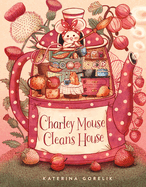
| Publisher: | Red Comet Press | |
| Genre: | Animals, Humorous Stories, General, Mice, Hamsters, Guinea Pigs, etc., Juvenile Fiction, Fairy Tales & Folklore | |
| ISBN: | 9781636551418 | |
| Pub Date: | March 2025 | |
| Price: | $19.99 |
| Children's & Young Adult |
by Katerina Gorelik
Charley Mouse Cleans House is a delightful and enchanting picture book by Curious Creatures series author/illustrator Katerina Gorelik.
Charley Mouse lives in a cozy teapot and "loves cleanliness and order." Thus, Charley adores her job tidying the homes of the other residents of the Wild Wood and the Magical Forest. Readers follow Charley as she travels from house to house, starting with the Mole family's burrow, moving on to Mr. Snail and the Frog's swamp, and finishing with the Gingerbread family's cinnamon chalet. Cross sections of each house allow readers to peek inside and see how the characters live: spooky decorations fill Madame Witch's Baba Yaga-like home; the Unicorns' house is filled with rainbows, sparkles, and fluffy pink. The immersive, full-page illustrations include search and find items along with plenty of opportunities for observation and reader-led storytelling. Some visual and narrative irony may go over the heads of little ones--Mr. Wolf's house is overflowing with the meat of his butchered neighbors--but Gorelik's book is sure to provide an entertaining read that will be returned to many times. --Michelle Anya Anjirbag, freelance reviewer

| Publisher: | Gibbs Smith Kids | |
| Genre: | Activity Books, Trees & Forests, General, Science & Nature, Curiosities & Wonders, Juvenile Nonfiction | |
| ISBN: | 9781423665533 | |
| Pub Date: | April 2025 | |
| Price: | $19.99 |
| Children's & Young Adult |
by Susie Spikol, illust. by Renia Metallinou
Author Susie Spikol and illustrator Renia Metallinou's first collaboration, Forest Magic for Kids, offers a charming and whimsical array of activities, crafts, and ruminations to encourage children to find wonder in the natural world. Readers are encouraged to step outside, look around, and enjoy some essential "open-ended time in nature." Spikol suggests a list of top 10 tools for a "Forest Magic Search" and a DIY secret notebook for "planning, creating, and designing," then delves into potential activities featuring green plants and wildflowers, foraging, mushrooms, "wee" forest inhabitants, or hidden worlds. She offers abundant prompts for creative thinking, such as recipes for dandelion tea and lembas bread, fanciful crafts like a "mini magical moss garden," and hints for sighting myriad marvelous creatures, including gnomes, trolls, and, of course, fairies. Metallinou's full-color, deeply saturated art offers images of fairy folk, the instruments needed to make the magic, and children taking part in the suggested activities. Science, folklore, and imagination come together in this delightful offering brimming with ideas to get kids thinking, observing, and discovering outdoor wonders. --Lynn Becker, reviewer, blogger, and children's book author